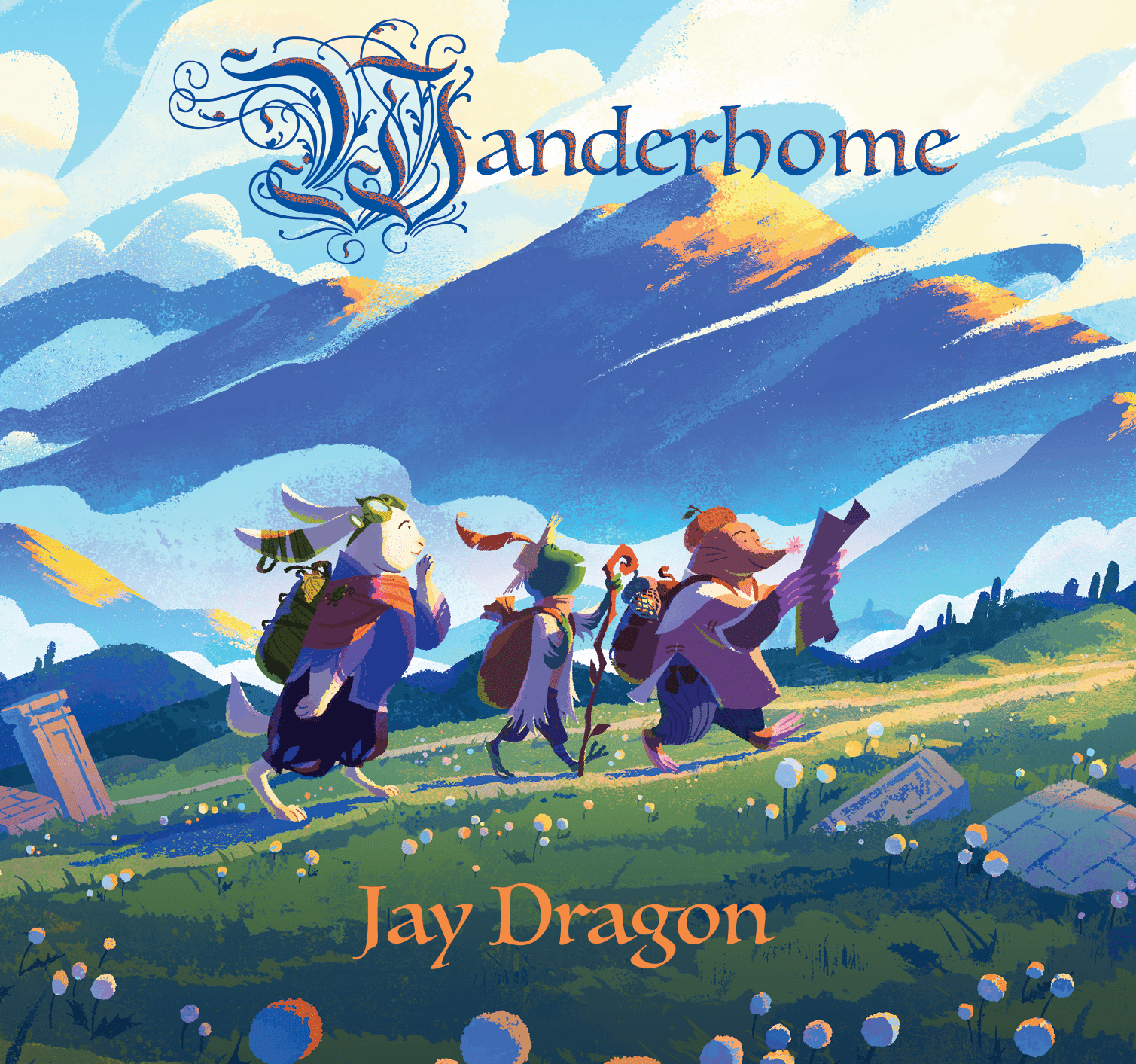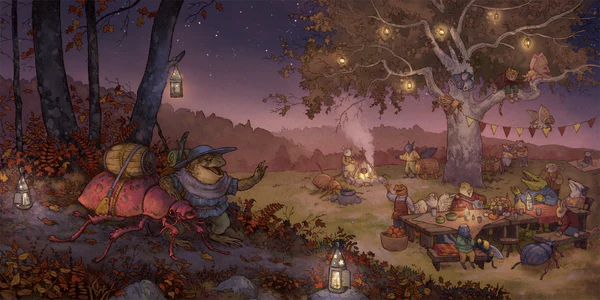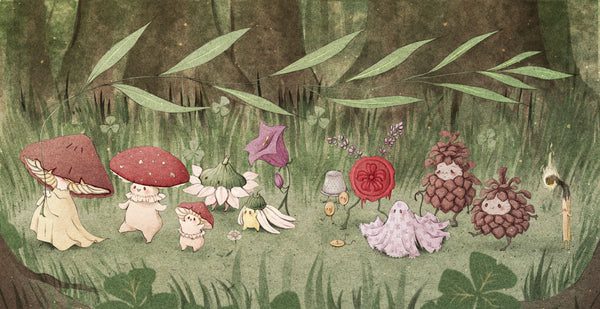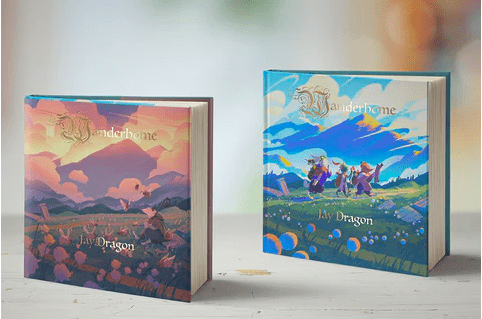As far as I’m concerned, Wanderhome by Jay Dragon has changed the face of TTRPGs. While Jay has written Sleepaway, Yazeba’s Bed & Breakfast, and is currently writing Seven Part Pact (with the legendary forty page playbooks!), it’s Wanderhome that holds a special place in my heart. This game is what showed me that TTRPGs can be art and a vehicle towards connection in addition to a game.

Wanderhome is a Belonging Outside Belonging, a GM-less, diceless TTRPG published by Possum Creek Games. Wanderhome is built around themes of community, belonging, the effects of war and trauma, and healing in the land of Hæth. It’s a game about how we rebuild after horrible things that have happened to us and how we grow as people. Most of all it’s about how home is not a single place, it’s where the folks you love are with you.
One important aspect of the Belonging Outside Belonging system that’s necessary to understand the game is that Belonging Outside Belonging, despite saying GM-less, is a group GMing experience. You are all players and you are all the GM in how the game is played, rules as written. There can be a traditional GMed (or Guided) experience, but the game was designed with GM-less play at the forefront. With everyone being a GM and a player at once, it may be difficult to bring shyer roleplayers into the fray as they may feel unprepared or second guess themselves. Wanderhome asks us to be patient, kind, and welcoming to folks trying something new for the first time and to encourage them to do only what they’re comfortable with. You are all sharing control of the environment, side characters, and safety.
The Gameplay

1. Setting Journey Expectations.
Setting expectations is a part of the safety tools section of the book (which holds wonderful advice) and it helps prepare the players for what they’d like from the game. Would the table want a longer or shorter campaign or maybe just a one shot? Would you want a guide figure or a collaborative experience? More personal or more large scale stakes? The choice is up to the table and folks at the table always have the option to leave if they aren’t comfortable with things in the narrative. An open table is a great safety tool listed right at the start of Wanderhome along with many others.
2. Choose a Playbook and all it entails.
Playbooks are kind of like classes, but more narrative and archetypal! Wanderhome playbooks start by giving you a short and unique playbook description and asking your character’s name and pronouns. From there, what kind of animal you are (with a list if you need inspiration), 3-4 things to describe your look, and other playbook specific questions. Some of these playbooks to me are immediately reminiscent of queer elders that many young queer kids, like I was once, needed in our lives that we might not otherwise get the joys of knowing or their mentorship. Playbooks in Wanderhome also have moves that inform how the playbooks interact with the world around them and that can be played to gain and spend tokens to advance the plot. They are Things You Can Always Do, Moves to Gain Tokens, and Move that Costs Tokens. This style of play incentivizes players to interact with one another and the world around them in small ways and always keeps relationships with others in the view and scope of the story.
One key to understanding the land of Hæth is knowing the world is recently post war. This information can be found in the start of the game and The Veteran playbook. In a fight for peace and for a better world there is often many harmed trying to achieve that peace. Often, folks left behind by this violence are unlearning the violence they had to demonstrate to survive day to day. The Veteran is a playbook trying to find their place in the world again when the time of violence is no longer, and never will be, in Hæth again.

3. Describe the part of Hæth you are traveling through.
Hæth is left largely undescribed by Jay for a reason. She wants your Hæth to be yours. She’s given you the space to play with the world by providing Natures, settings with a specific emotional style associated with them. These places can range anywhere from a desert, to a graveyard, a mirage, mountains, and many more places. Each Nature has a list of things it can always do (like playbook move moves, but for the landscape), aesthetic elements, and a piece of folklore to choose from or to make up for your table.
4. Playing until the table feels the scene or scenes are complete and until the table feels the session is complete.
Once everyone feels that this stretch (or perhaps the journey itself) is complete, the game winds to a close. You travel on, gather around a hearth fire and sleep under the stars, and hold one another close in your hearts. Session lengths for me can range, but I usually aim for three hours maximum.

The Vibes
My own experience with Wanderhome was heavily informed by a recent charity Actual Play for The Lore Mistress’s channel. Run by my friend Okami, it was an Interlude in the overarching narrative of a campaign called “A Season’s Oath”. I had played The Veteran playbook as Cairbre, a hellbender who served under the Prince of the Floating Mountain (before it was floating) and trying to heal from the trauma of war. Other castmembers included Felicity as Star, The Exile cat in diaspora, Tomas (a member of the arc one cast) as Ricardo The Fool (and honestly one of the kindest little guys ever), and Wren as The Honey Badger Rebel – a rebellion member during the war and foil to my own character.
As a disabled queer person who has always had trouble fitting in, even in spaces where I am wanted and respected, this session was emotionally healing. From convincing another king to abdicate their throne, learning of our character’s pasts while trusting each other with our character’s pain and burdens, meeting friends new and old, and guiding our traveling partners through darkness with each of us as lights to find and hold one another, it was something healing I didn’t know I needed. This session was the first and only time I’ve cried on stream. It was possibly my favorite session of the year so far. Jay has somehow bottled queer hope for a better future and gives us a glimpse of that better world that is possible for all of us.
To me, the game that Wanderhome is feels like the push and pull of the tides and the moon, the circle of seasons changing but always returning, a hug from a friend, and a call home to find a kindness you didn’t know you needed.
You can grab a copy of Wanderhome from the Possum Creek webstore, itch.io, DTRPG, or at your FLGS. PDFs are at an MSRP of $25.00, with the harder to find physical books running you around $45.
Images Courtesy of Possum Creek Games
Have strong thoughts about this piece you need to share? Or maybe there’s something else on your mind
you’re wanting to talk about with fellow Fandomentals? Head on over to our Community server to join in
the conversation!


